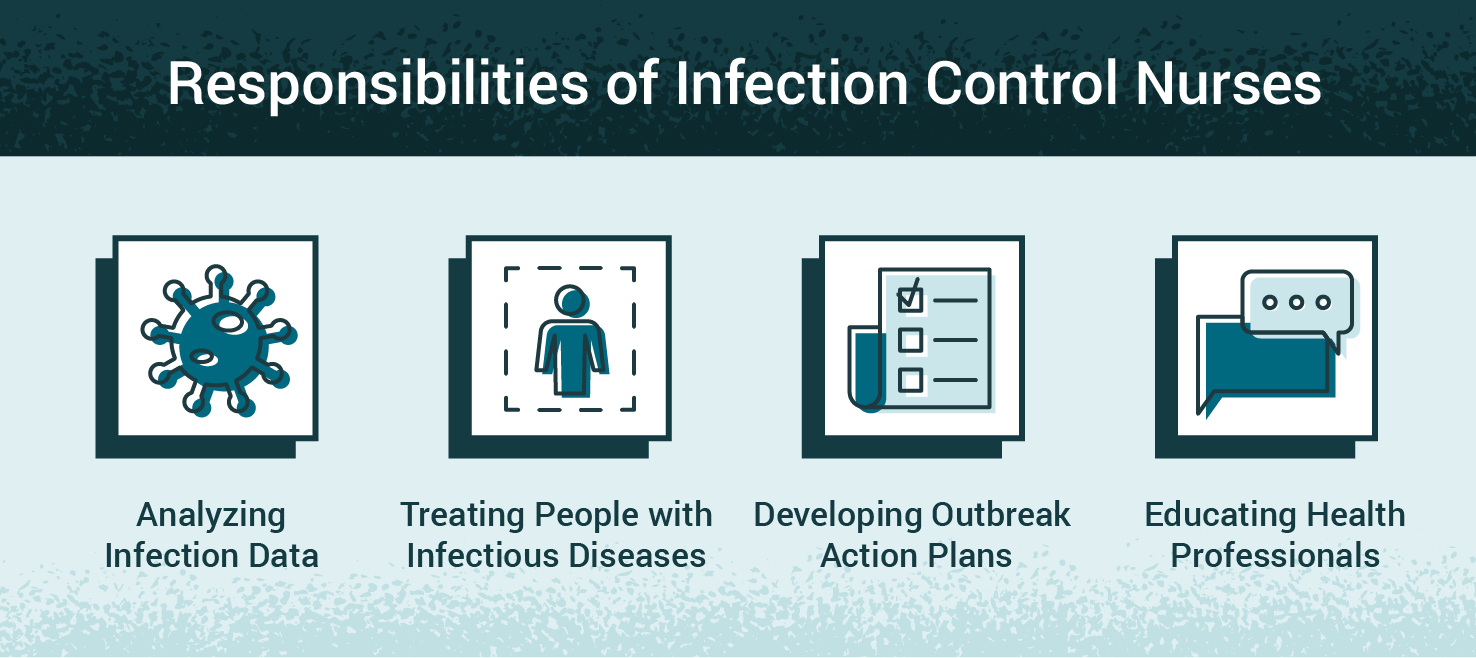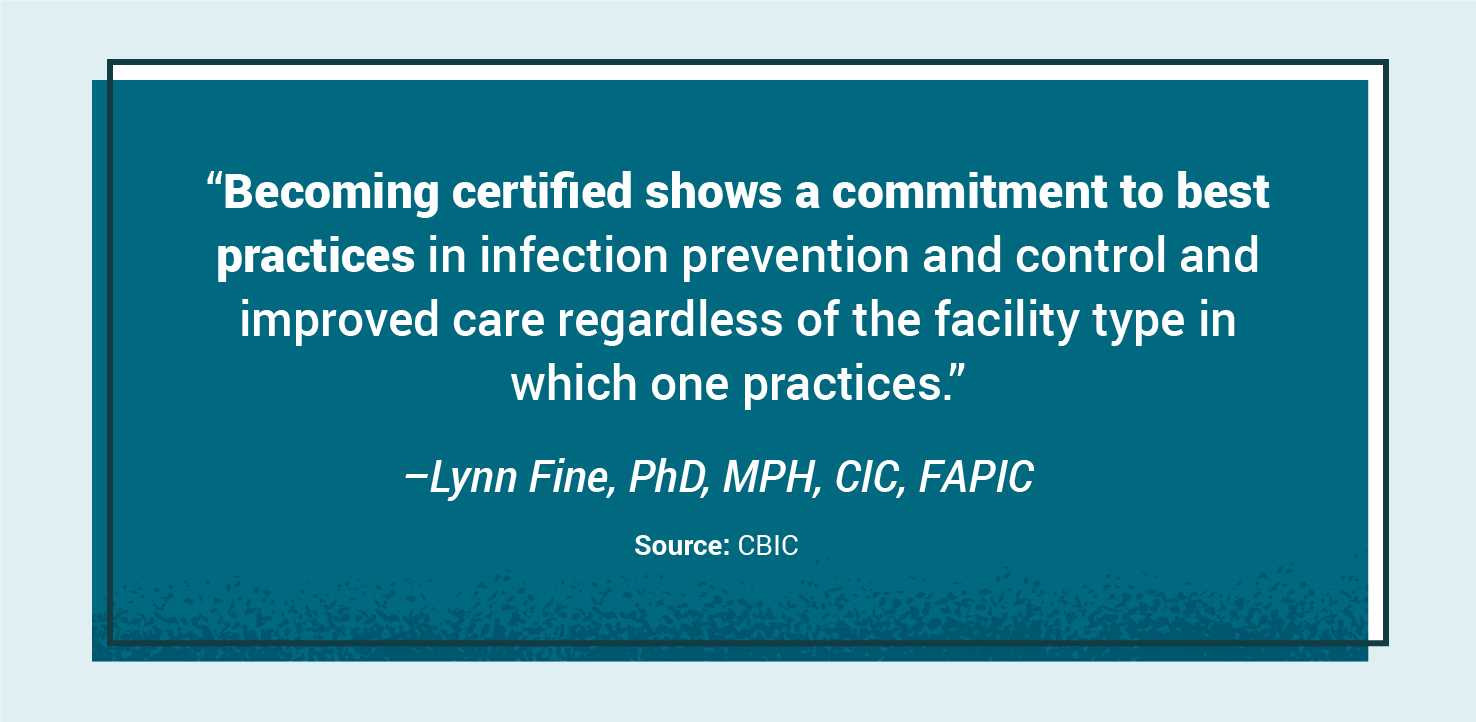
Outbreaks of infectious diseases are rising globally, ((Christiansen, Jen, “Global Infections by the Numbers,” Scientific American, May 1, 2018: https://www.scientificamerican.com/article/global-infections-by-the-numbers/)) and infection control professionals are constantly facing new challenges, such as bacterial resistance to antibiotics and the spread of highly contagious viruses like COVID-19. ((Baylor College of Medicine, “Emerging Infectious Diseases”: “https://www.bcm.edu/departments/molecular-virology-and-microbiology/emerging-infections-and-biodefense/emerging-infectious-diseases))
The COVID-19 pandemic underscores the global need for motivated nursing and medical professionals who specialize in developing and implementing infection prevention and control techniques. Infection control nurses play a critical role in protecting public health—and the need for new practitioners in this specialty is more evident than ever. This blog post breaks down the core responsibilities of an infection control nurse and outlines the educational requirements you need to step into this role.
What is Infection Control?
Infection control is the practical discipline of preventing infections acquired in healthcare settings. Akin to a public health practice, infection control is an essential process of every healthcare organization. It addresses factors related to the spread of infections among patients, among staff, and between patients and staff. This includes preventive measures such as hand washing, cleaning, disinfecting, sterilizing, and vaccinating. Other aspects include monitoring and managing outbreaks of infection and investigating their causes.3
What Is an Infection Control Nurse (ICN)? ((Registered Nursing, “Infection Control Nurse,” last updated/verified Feb 24, 2020: https://www.registerednursing.org/specialty/infection-control-nurse/)), ((GraduateNursingEDU.org, “Infection Control Nurse (ICN)”: https://www.graduatenursingedu.org/infection-control/))
An infection control nurse is a registered nurse (RN) who implements best practices for halting the spread of viruses and bacteria and delivers top care to patients who have contracted infectious diseases. In this profession, it is critical to have strong attention to detail, the ability to work well under pressure, and excellent communication skills.
What Does an Infection Control Nurse Do?


Infection control nurses work not only with patients and physicians but also with scientists, public health experts, and government agencies to protect the health of individuals and the public. Each year, nearly two million healthcare-associated infections occur in the United States, resulting in close to 100,000 deaths. ((Monegro et al., “Hospital Acquired Infections,” StatPearls, last updated Jan. 7, 2020: https://www.ncbi.nlm.nih.gov/books/NBK441857/)) Clostridioides difficile (C. diff), Staphylococcus aureus (staph), Klebsiella, and Escherichia coli (E. coli) are the most common pathogens causing hospital-acquired infections. Some responsibilities of infection control nurses include:
- Gathering and analyzing infection data to make evidence-based decisions
- Educating medical and public health professionals on infection prevention protocols to facilitate emergency preparedness
- Isolating and treating infected individuals to contain the spread of infectious diseases
- Assisting with the development of action plans in case of a community or hospital outbreak to minimize the potentially devastating impact
- Collaborating with government agencies such as the CDC to ensure that infection control practices are implemented and enforced
- Studying pathogens to determine origin in order to prevent future outbreaks
- Assisting scientists and physicians with developing treatments and vaccines to ensure the health and safety of patients and the community
Where Do Infection Control Nurses Work?
Infection control nurses work in a variety of healthcare settings, including:
- Hospitals
- Nursing homes and residential care facilities
- Community care centers
- Home health or ambulatory care settings
- Hospice programs
- Public health departments
- Emergency preparedness organizations
Education Requirements
In order to practice as an infection control nurse, you will at minimum need to become a registered nurse (RN) by graduating from nursing school and passing the NCLEX-RN licensure exam.
If you choose to enter a graduate program, you also need to have an RN license to apply to most Master of Science in Nursing (MSN) and Doctor of Nursing Practice (DNP) programs.
Learn More About Our Nursing Programs
How to Obtain an Infection Control Certification


After you have at least two years of experience practicing as a registered nurse, you will be eligible to sit for the Certification in Infection Prevention and Control (CIC®), which is awarded by the Certification Board of Infection Control and Epidemiology (CBIC®).
In order to be eligible to take the CIC, you must meet the following requirements ((Certification Board of Infection Control and Epidemiology, “Requirements for CIC® Initial Certification and for Lapsed Certificants”: https://www.cbic.org/CBIC/Candidate-Handbook/Eligibility-Requirements.htm)):
- You have a post-secondary degree from an accredited institution (associate degree or higher) or a three-year diploma RN degree (applicable through December 31, 2020).
- You have sufficient experience (two years are recommended) identifying, surveilling, preventing, and controlling the transmission of infectious diseases.
- You have experience with at least two of the following:
- Employee/occupational health
- Management and communication
- Education and research
- Environment of care
- Cleaning, sterilization, disinfection, and asepsis
- You have a relevant job title (e.g., infection preventionist, epidemiologist).
Getting this certification demonstrates that you are an expert in infection control in accordance with the professional standards developed by the Association for Professionals in Infection Control and Epidemiology. APIC is the leading professional association for infection preventionists, with over 15,000 members. According to APIC, a growing number of employers expect candidates to be working toward or hold a CIC®, as it shows them that candidates are knowledgeable about best practices in infection prevention and control and have a strong commitment to professional growth.
Thanks to the increased awareness of risks and the additional preventive measures being taken in hospitals, the medical community has made significant progress in reducing the incidence of various types of hospital-acquired infections. The COVID-19 outbreak clearly demonstrates the need for personal protective equipment and planning in the fight against pandemics of dangerous pathogens.
Learn more about our advanced nursing programs here.
Additional Resources:
- Centers for Disease Control and Prevention (CDC)
- Association for Professionals in Infection Control and Epidemiology (APIC)
- American Journal of Infection Control
The University of St. Augustine for Health Sciences (USAHS) offers Master of Science in Nursing (MSN), Doctor of Nursing Practice (DNP), and Post-Graduate Nursing Certificates designed for working nurses. Our degrees are offered online, with optional on-campus immersions* and an annual interprofessional trip abroad. Role specialties include Family Nurse Practitioner (FNP), Nurse Educator,** and Nurse Executive. The MSN has several options to accelerate your time to degree completion. Complete coursework when and where you want—and earn your advanced nursing degree while keeping your work and life in balance.
*The FNP role specialty includes two required hands-on clinical intensives as part of the curriculum.
**The Nurse Educator role specialty is not available for the DNP program.
3 “Infection Prevention and Control,” Wikipedia: https://en.wikipedia.org/wiki/Infection_prevention_and_control






